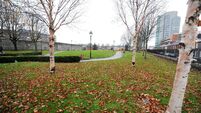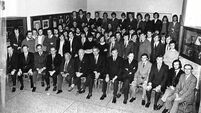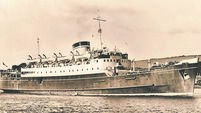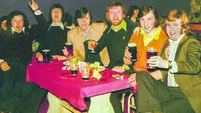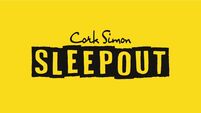What was in the news 100 years ago today: IRA and drunk auxiliaries clash
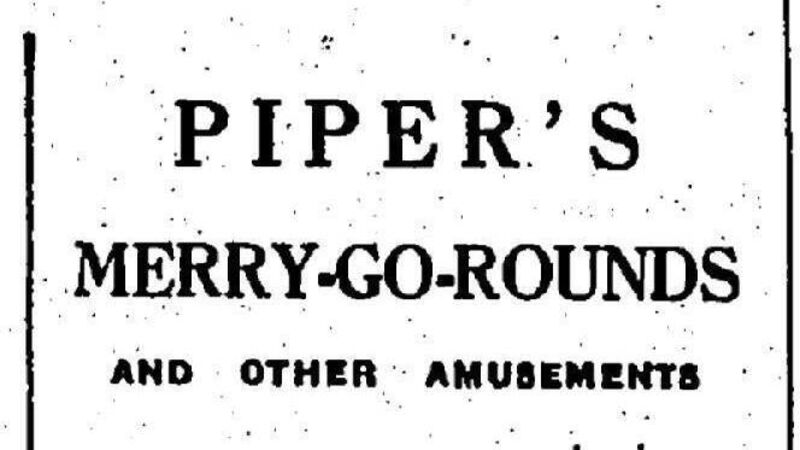
An advertisement in The Echo, 100 years ago.
AN IRA officer accompanied by some friends was passing through Clonakilty in a motor car on Thursday when he was recognised by people in the town, the Echo reported on Saturday, September 17, 1921.
A crowd gathered about his car and it was unable to proceed.
Using obscene and threatening language, the Auxiliaries attempted to photograph the occupants. The IRA officer gave an order to have some of the local company turn out, whereupon the Auxiliaries drove off.
Packed excursion trains, bicycles, outside cars and ‘shank’s mare’ brought thousands to the famous Blarney Sports last Sunday, only for rain to spoil proceedings. A highly competitive and enjoyable afternoon was unfolding when the downpour forced an abandonment.
That strong sprinter, Michael Nagle of Killavullen, is running well these times and his victory was most popular. He is an honest athlete, always a trier and out to win.
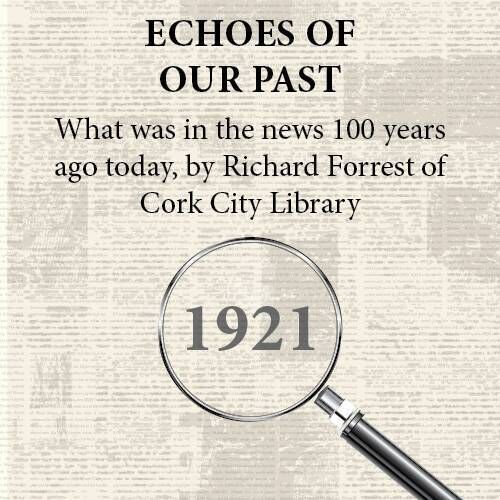
Kenny of Fermoy finds the Blarney track much to his liking and rode a fast race. He is a persevering type who rides best on a good grass track. The later cycle races would have been most interesting as a big group of southern wheelmen were present.
Tipperary runner, J.J. Ryan is coming back to his old paces and picked up all his men in the mile flat with the exception of the improving Carrigaline man Corcoran.
Some right good high jumping was unfolding between the Irish joint champions Shanahan and Sheehan, but they had stout opposition in popular mid-Corkman David Buckley of Rylane.
Word from the Mansion House last night is that Mr de Valera telegraphed Lloyd George to the effect that Ireland’s position does not appear to be satisfactorily understood by London.
Mr de Valera is of the opinion that Lloyd George’s letter of September 7 does not grasp the basis for Ireland re-entering peace talks. It would be a disservice to all sides if Dáíl Éireann representatives attended without the Irish position being clearly understood. As it is, the position of the two sides are quite opposed.
The Secretary of the Irish Dominion League, Henry Harrison asserts that the current impasse in negotiations was not difficult to predict. On the one side are the Irish people, endeavouring by force of arms to assert the right to sovereign independence. On the other, the British people, endeavouring by force of arms to maintain the right to govern Ireland. Neither side has suffered decisive defeat. Therefore, there can be no dictated peace.
Lloyd George must not compel de Valera to accept the Empire, nor de Valera compel Lloyd George to accept Ireland’s sovereign independence.
The British should lay out their peace and settlement offers in exact and practical detail and the Dáil delegates scrutinise same and either accept or reject.
Alternatively, they could put the offer to the Irish people with accompanying advice.

The price of coal in Cork has again been reduced, this time by 7 shillings a ton. It will yield yet further benefit to the public and will be joyously welcomed.
A Cork coal merchant has explained to us that the fall is a result of trends in England and not to any appreciable extent due to the recent reduction in the wages of the Cork coal carriers and storemen. That accounts only for a few pence per ton.
The miners’ strike in England lasted three months and miners’ wages are now governed entirely by output. As a result, he is now working as he never worked before, even in pre-war days.
By mutual agreement between the Military and IRA authorities, John Gerard Foley, IRA Bandon, and Constables Baker and Simpson, RIC, were simultaneously released on Thursday at 5pm. Foley had been arrested in connection with the armed seizure of a motor car from the police and tried by court martial at Cork military barracks.
The constables were kidnapped in retaliation, escaped after 14 days, and a few days later were taken a second time.
